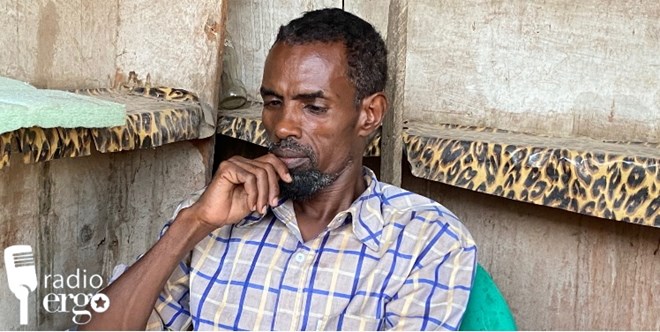
Saturday May 13, 2023

Omar Mohamed shut his fruit drinks stall in Hagadera camp and currently has no income/Bashir Gahnug/Ergo
(ERGO) – Somali refugees living in the Dadaab camps in northern Kenya are facing shortages of food after supply routes were cut off by floods.
Asho Hussein Abdi, a refugee mother of 10, says the prices of food and vegetables has been rising since the downpours began on 20 March.
Her family receives an aid allocation of 25kgs of sorghum in the camps, and she also earns from laundry jobs when she can.
“There is nothing coming in, the food has become expensive, rice, sugar and flour have risen to the sky. I don’t know what to do. I don’t have food to cook for the child. My life is in chaos, we didn’t cook last night or even this morning, I don’t have anything else for now,” she complained.
The blocked roads prevent her from going out to seek two dollars from laundry jobs.
Some shops in the camp have closed as they have no produce on the shelves, while others have raised the prices of the remaining goods. They have stopped giving credit to customers.
Asho, 54, who has been diagnosed with diabetes and high blood pressure, says whenever the rain stops she walks around looking for cleaning jobs.
“I feel a great burden, because I am a poor person with children. I wake up in the morning and go to wash clothes. Customers complain saying the shirt collar hasn’t been cleaned or there are stains on the clothes, or why did I wash the white clothes in a certain way. They tell me to wash the clothes again or leave. I am forced to pick up the clothes again and wash them so that I can get an income,” she said.
Her family came to the Dadaab camps in February 2012 after fleeing from drought in Jowhar, Middle Shabelle region. Asho’s husband died in Dadaab in 2021.
Faduma Sidawa Yusuf, another refugee, works as a midwife with the International Committee of the Red Cross (ICRC) in the camp. Her salary of $70 is being stretched to the limit with the price rises. She has a family of 17 people to support. Her family receives 32 kilos of sorghum, seven litres of cooking oil, and $49 cash as aid every month.
“Life is very difficult, only God can provide a solution. Previously, we used to cook twice, but now we can only cook rice once. Some people brought us some rice. We’ve had to stop making tea for the children,” she said.
Omar Mohamed Abukar has also been struggling to support his family of eight. He closed his small shop selling ice and fruit drinks due to lack of supplies and fresh fruit. They have also been affected by the fall in the value of the Kenya shilling on exchange markets.
“There is no electricity nor any fruit available, the dollar rate has risen, and personally I don’t earn dollars anyway. I used to support my family with my earnings, so it has affected me personally and the people generally,” he said.
Omar says his family were eating three meals a day and are down to one. He also has to ask relatives to send them some money to keep them going.
According to traders in the camp, there have not been any goods arriving for the past three weeks from either Garissa in Kenya or Kismayo in southern Somalia.
Abdikifah Shukri Ali, a trader in Hagadera camp, said the combination of road closures, high dollar exchange rate, and less aid circulating in the camps have left businessmen and ordinary refugees in a very challenging situation.
“The people are suffering and most of them are poor. People are struggling to find food and drinks. Roads are closed and there are many people living here. Vegetables and food supplies have been cut, so we are asking the Kenyan government to do something for us as soon as possible,” he stated.